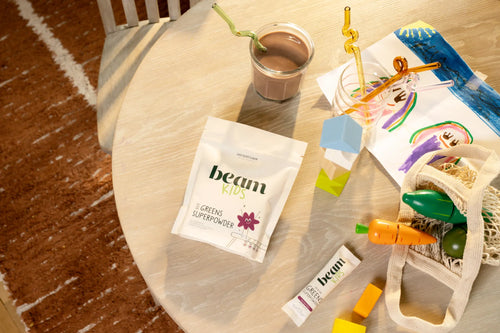Best Supplements for Toddlers Who Won't Eat Vegetables
Does your toddler push veggies to the side or insist on eating only a few familiar foods? You’re not alone. Many parents face this challenge, and it can be stressful trying to make sure their little one still gets all the essential nutrients for healthy growth. When your child refuses to eat vegetables, certain supplements for toddlers who won’t eat vegetables can help bridge those nutritional gaps until their eating habits improve.
The good news? Most kids go through this phase. Picky eating is normal, and with a little creativity, patience, and the right nutritional support, you can help your child develop a more balanced relationship with healthy foods over time.
Start with Whole Foods
Before reaching for vitamin supplements, remember that most children can get what they need from whole foods. According to the American Academy of Pediatrics, healthy kids who eat from all major food groups usually don’t need additional supplementation.
Still, when your toddler flat-out refuses to eat veggies or certain solid foods, you may need a temporary solution to make sure they get enough vitamins and minerals. That’s where nutritional supplements can help, offering peace of mind while you keep encouraging variety at the table.
Why Picky Eating Is Normal
Picky eaters are common between the ages of two and six. During this stage, your child is exploring independence and learning to control what goes into their mouth. They might only accept the same food every day or reject anything that looks unfamiliar. Their taste buds are also more sensitive than adults’, which can make leafy greens and other veggies taste bitter.
Research suggests it often takes 8 to 15 exposures before toddlers begin to accept a new food. The key is repeated, gentle exposure—not pressure. Pair them with favorite items or dips like hummus or yogurt-based ranch dip. The key is gentle repetition, not forcing.
If you’ve tried every trick in the book and your toddler still resists vegetables, don’t worry—picky eating is part of growing up.
Fruits and Vegetables First
Even fussy eaters who avoid greens often enjoy fruit. Start meals with fruits and vegetables when your toddler is hungriest, offering colorful options like berries, cucumbers, and bell peppers. Try combining organic fruit with mild veggies to make new flavors less intimidating. For example, mix apples with carrots or blend spinach into a green apple smoothie.
Offer New Foods Often
When introducing new foods, keep it light and consistent. Place a small portion next to something familiar, like pasta or rice. Eat the same vegetables yourself and talk about how delicious they are. Modeling positive behavior is more effective than insisting they eat something they’re not ready for.
If your child only wants french fries or refuses everything green, don’t panic. Stay calm and keep offering. Over time, exposure to healthy foods will encourage curiosity and acceptance.
When Supplements Make Sense
Supplements become useful when picky eating goes on for weeks or when your toddler consistently skips vegetables. The goal isn’t to replace real food but to help fill short-term nutritional gaps and support a balanced diet while you work on new eating habits.
Before adding any supplement to your child’s routine, it’s always best to get personalized advice.
Talk to Your Child’s Doctor
Your board-certified pediatrician can help determine if your toddler needs vitamin supplements. Bring a short food diary so they can assess diet patterns, nutrient deficiencies, or possible food allergies. Some kids with multiple food allergies may need extra iron supplements, vitamin D, or B vitamins to stay on track with growth and cognitive development.
Key Vitamins and Nutrients for Toddlers
Vitamin D
Most kids need about 600 IU of vitamin D each day. It supports strong bones, immune health, and even mood. Many children don’t get enough, especially during winter or if they avoid fatty fish and fortified milk.
Iron
Iron helps create red blood cells that carry oxygen throughout the body. Low iron can cause fatigue, iron deficiency anemia, and slower growth. Aim for iron-rich foods like lentils, beans, or fortified cereals. If your pediatrician recommends an iron supplement, follow dosing carefully.
B Vitamins
The B vitamins help the body turn food into energy and support brain function. Children who avoid meat or grains may miss out on these important vitamins.
Vitamin C and A
Both vitamin C and vitamin A are crucial for healthy skin, eyes, and immune function. These vitamins are abundant in fruits and veggies, which picky eaters often skip. A nutritional supplement can help ensure your child gets enough vitamins for daily wellness.
Choosing Safe Supplement Forms
Selecting the right supplement form makes it easier for toddlers to get what they need.
- Powder form: Mixes easily into drinks or foods and offers clean, plant-based nutrition without sugar or sugar alcohols.
- Liquid supplements: Good for younger children who can’t chew tablets yet. Always follow dosing instructions.
- Chewable tablets: Suitable for older toddlers who can safely chew. Supervise during use to prevent choking.
Once you’ve found a supplement that fits your toddler’s needs, consistency matters most.
Beam Kids Greens Superpowder Helps Picky Eaters Thrive
If your toddler still refuses to eat veggies despite your best efforts, Beam Kids Greens Superpowder can help fill the gap. This gluten-free, sugar-free, and non-GMO powder delivers plant-based nutrition from real fruits and vegetables. It’s packed with essential nutrients that support immunity, digestion, and healthy growth.
Just one scoop mixed into milk, yogurt, or a smoothie adds the goodness of leafy greens, vitamin C, vitamin A, B vitamins, and minerals from iron-rich foods like spinach—without the mealtime struggle.
Parents love how easy it is to use. Mix it into oatmeal, blend it with banana and maple syrup, or stir it into a cup of milk. It’s quick, clean, and loved by families who value good nutrition made simple.
Support a Balanced Diet at Home
Supplements help fill in certain nutrients, but they work best alongside a varied diet. Aim to include all five food groups, such as grains, proteins, dairy or alternatives, fruits, and vegetables, each day.
Encourage your toddler to help with meal prep by letting them stir, pour, or choose which fruits and vegetables to serve. This helps your child feel involved and more open to eating foods they helped prepare.
Healthy Mealtime Habits
- Add healthy fats: Drizzle olive oil on veggies or blend avocado into smoothies. Fats help absorb certain vitamins and make veggies taste better.
- Be patient: It can take several attempts before your toddler accepts a new flavor.
- Stay consistent: Keep offering small portions of new foods without pressure.
- Model healthy eating: Kids copy what they see, so make sure your toddler sees you enjoying your veggies too.
Helping Your Toddler Grow with Confidence
Helping picky eaters build healthy habits takes time, but small steps matter. Beam Kids makes it easier for families to maintain a balanced diet during challenging stages.
Start with whole foods, use supplements only to support your child’s nutritional needs, and always consult your child’s doctor if you’re unsure. With patience, consistency, and smart nutrition choices, your toddler will get the essential nutrients they need for normal growth and development—even if veggies are still a work in progress.
Frequently Asked Questions
Should I give my toddler supplements if they won’t eat vegetables?
If your toddler refuses vegetables for an extended time, supplements can help cover short-term nutritional gaps. Look for options designed for children that include plant-based ingredients and essential vitamins. It’s still important to keep offering vegetables in different forms to build healthy long-term habits.
Are green powders safe for toddlers?
Green powders can be safe for toddlers when they’re specifically formulated for children and free from added sugars, caffeine, and artificial flavors. Always check the ingredient list and talk to your pediatrician before introducing any new supplement.
What nutrients do toddlers miss when avoiding vegetables?
Toddlers who avoid vegetables often miss out on fiber, vitamin C, vitamin A, folate, B vitamins, and iron. These nutrients support growth, digestion, and immune function. Offering a variety of fruits, fortified foods, or kid-safe nutritional supplements can help close those gaps.
When should I talk to my child’s doctor about picky eating?
Reach out to your child’s doctor if your toddler’s diet is limited to only a few foods, or if you notice signs like fatigue, frequent illness, or slower growth. A pediatrician can check for nutrient deficiencies and suggest safe, age-appropriate ways to support balanced nutrition.



